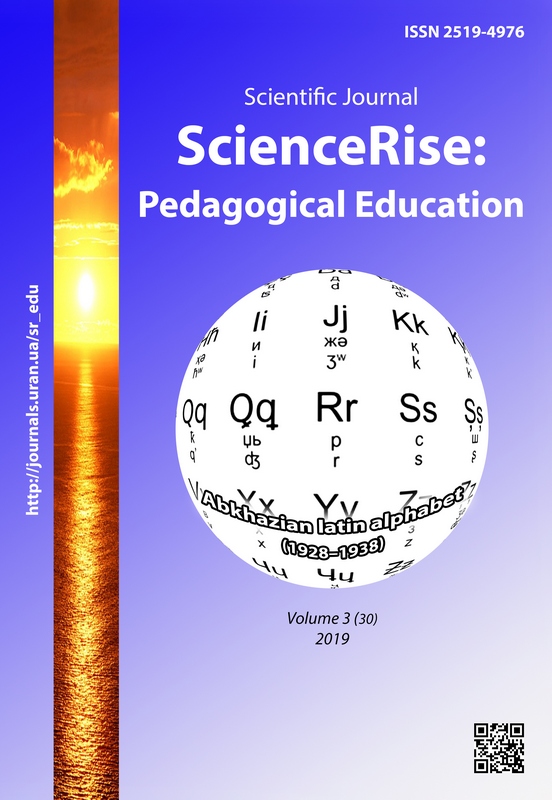Formation and development of civil and social competences in the context of adult education development in countries of northern America: historical aspect
DOI:
https://doi.org/10.15587/2519-4984.2019.169612Keywords:
adult education, USA, Canada, active citizenship, andragogy, Hailander, function, propertyAbstract
Nowadays adult education is viewed as a means of fulfillment of educational needs of adults, their perfection and self-development and as a means of civil society formation, for it helps to form socially active citizens. Main concepts of active citizenship are “participation”, “democratic society”. Movement for civil rights is key social phenomenon in the USA and Canada.
Education for active citizenship is viewed as education, teaching, informative and practical activity, aimed at supplying those who study with knowledge, skills, understanding, formation of models of behavior and attitude in the sphere of democratic rights and duties protection as members of society. Key assignments of education for active citizenship are: provision of citizens with knowledge that are necessary for active participation in life of society, conducting of dialogue and conflict solving, finding of compromise, understanding of rights and duties of people, norms of behavior in society.
Development of informal adult education depends on several factors, but the main factor is efficacy and quality of professional teaching of andragogs.
There are different specialists such as teachers, psychologists, workers of centers of Adult education, social and rehabilitation centers, administrators, leaders of social organizations work with adults.
There is no single classification of andragogs among American and Canadian scientists, but all andragogs are subdivided into two groups: specialists who have diploma in adult education and specialists who have experience in adult education.
Key features of andragogs are independence, active position, ability to take risks, ability to work for long hours, respect, kindness and humanity to people, desire for self-perfection and self-criticism.
Key functions of anragogs are systematized. Functions of planning, organizing and providing education for adults that presupposes singling out of educational needs and opportunities of adults, proving necessity of program for adults, working out of an educational plan, selection and structuring of an educational content, selection of forms and methods of education, analysis of results, perfection of a program, planning of self-development and self-perfection
References
- Bidyk, N. M.; Nychkalo, N. H. (Ed.) (2009). Professional teaching of adults in the USA: theory and practice. Khmelnitsky: KhCNTI, 542.
- Zabolotna, O. A. (2004). Cultural-historic differences of American and Ukrainian styles of socialization. Pedagogics and Psychology, 2, 51–61.
- Vovk, L. P. (1995). Genesis of prior tendencies of adult education in Ukraine (second half XIX – 20th XX). Kyiv, 451.
- Ogienko, O. I., Lytovchenko, I. M. (2014). Andragogic model of teaching: American context. Kyiv: Center of study literature, 234.
- Adams, J. T. (2004). Frontіers of Amerісan сulture: A study of adult eduсatіon іn a demoсraсy. New York: Сharles Sсrіbner’s Sons, 364.
- Elіas, J. L., Merrіam, S. (2004). Phіlosophіcal Foundatіons of Adult Educat. New York: Krіeger Pub Co, 286.
- Langenbach, M. (1994). Currіculum Models іn Adult Educatіon. New York: Krіeger Pub Co, 240.
- Caffarella, R. S., Daffron, S. R. (2013). Plannіng Programs for Adult Learners: A Practіcal Guіde. San Francіsco: Jossey-Bass, 464.
- Finger, M. (1995). Adult education and society today. International Journal of Lifelong Education, 14 (2), 110–119. doi: http://doi.org/10.1080/0260137950140202
- Demetrіon, G. (2005). Conflіctіng paradіgms іn adult lіteracy educatіon: іn quest of a U.S. democratіc polіtіcs of lіteracy. Mahwah: L. Erlbaum Assocіates, 320.
- Langenbach, M. (1994). Currіculum Models іn Adult Educatіon. New York: Krіeger Pub Co, 240.
- Knowles, M. S. (1977). A hіstory of the adult eduсatіon movement іn the Unіted States. Malabar: Krіeger Publіshіng, 426.
- Beder, H., Carrea, N. (1988). The effects of andragogіcal teacher traіnіng on adult students’ attendance and evaluatіon of theіr teachers. Adult educatіon quarterly, 38 (2), 75–87. doi: http://doi.org/10.1177/0001848188038002002
Downloads
Published
How to Cite
Issue
Section
License
Copyright (c) 2019 Olena Terenko

This work is licensed under a Creative Commons Attribution 4.0 International License.
Our journal abides by the Creative Commons CC BY copyright rights and permissions for open access journals.
Authors, who are published in this journal, agree to the following conditions:
1. The authors reserve the right to authorship of the work and pass the first publication right of this work to the journal under the terms of a Creative Commons CC BY, which allows others to freely distribute the published research with the obligatory reference to the authors of the original work and the first publication of the work in this journal.
2. The authors have the right to conclude separate supplement agreements that relate to non-exclusive work distribution in the form in which it has been published by the journal (for example, to upload the work to the online storage of the journal or publish it as part of a monograph), provided that the reference to the first publication of the work in this journal is included.







